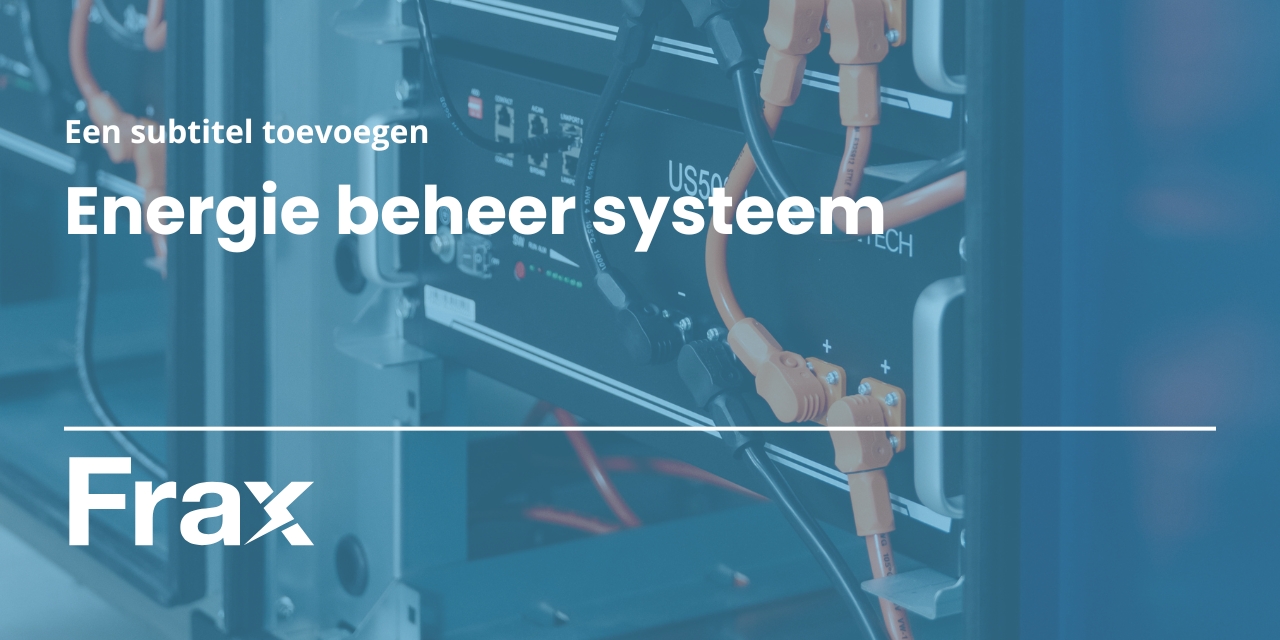A well-designed EBS is much more than just a measurement tool. It is a strategic tool that contributes to lower operational costs, more efficient use of energy resources and more sustainable operations. In this way, you build an energy-responsible future perspective step by step.
What is an energy management system?
An energy management system, often abbreviated to EBS, is an automated platform that maps, analyzes and optimizes energy consumption within a building, facility or organization. The system continuously collects data from various energy sources and consumption points, such as electricity, gas, heat and sometimes even water. This data is then displayed and analyzed in real time, giving you instant insight into where, when and how much energy is being used.
The purpose of an EBS is not only to provide information, but also to actively manage energy savings, efficiency and sustainability. This can be done by automatically adjusting settings, controlling installations or by providing you, the user, with clear advice and notifications. Modern systems are often equipped with smart algorithms and can make predictions based on historical data, seasonal influences and current market developments.
Functions of an EBS system
An energy management system performs several crucial functions to make energy consumption within your organization transparent and manageable. The main functions of an EBS include:
- Real-time monitoring of energy consumption and production.
- Record and store historical energy data for trend analysis.
- Detect anomalies or spikes in energy consumption.
- Automatic generation of reports and dashboards.
- Support in creating and following energy savings plans.
- Integration with other systems, such as building management systems or production software.
- Control of plants to optimize energy consumption, for example by reducing peak loads.
- Predicting future energy consumption based on historical and current data.
What do companies use an energy registration and monitoring system for?
Companies deploy an energy registration and monitoring system, such as an EBS, to take their energy management to the next level. The system not only provides insight, but also acts as a tool to achieve concrete goals in the areas of cost savings, sustainability and regulatory compliance. By collecting and analyzing real-time data, organizations can react faster to changes in their energy profile and take proactive measures to prevent waste.
In addition, an EBS enables companies to back up strategic decisions with reliable data. In the following sections, we zoom in on some of the key applications and benefits companies experience when deploying an EBS.
Realizing energy savings
One of the main reasons companies use an energy management system is to structurally reduce their energy consumption. Through real-time insight into consumption patterns, inefficiencies can be quickly identified and addressed. This can mean, for example, turning off equipment automatically outside working hours, reducing peak loads or planning processes smarter. The result is an immediate decrease in energy costs and a reduction in the load on the power grid.
Sustainability and carbon reduction.
More and more companies are striving for a lower carbon footprint and a more sustainable image. An EBS helps with this not only by saving energy, but also by providing insight into the origin of energy and the level of CO₂ emissions. Based on this information, companies can choose more sustainable energy sources and demonstrably improve their sustainability performance. This contributes to social responsibility and strengthens their competitive position.
Compliance with laws and regulations
Many industries have strict requirements for energy registration, reporting and efficiency. An EBS makes it easier to meet these obligations. The system can generate automatic reports that immediately meet the requirements of regulators and governments. This saves you time, reduces your administrative burden and prevents possible fines or penalties.
Optimization of business processes
In addition to savings and compliance, an energy management system can also help optimize business processes. By gaining insight into energy consumption per department, machine or production line, you can design processes more efficiently. This not only leads to energy savings, but often also to higher productivity and less downtime.
The energy savings obligation for businesses
In the Netherlands, many companies are subject to the energy savings obligation. This legal obligation means that organizations that consume more than 50,000 kWh of electricity or 25,000 m³ of natural gas (or equivalent) per year must implement all energy-saving measures that pay for themselves within five years. The goal is to significantly reduce energy consumption and carbon emissions in business.
An energy management system plays an important role here. By continuously monitoring energy consumption, an EBS can make clear where savings opportunities lie and which measures are most effective. Moreover, the system provides the ability to substantiate savings results with reliable data, which is important for both internal evaluations and external reporting requirements.
In some cases, the use of an energy registration and monitoring system may even be mandatory, for example, when the nature of the business activities or the extent of energy consumption warrants it. Because this not only allows companies to demonstrate that they are complying with the energy-saving obligation, but also to work structurally towards more sustainable operations.
Invest in an energy management system for your business!
An energy management system is not only a smart investment for today, but also a strategic choice for the future. By combining insight, control and optimization, it helps you reduce costs, make processes more sustainable and comply with laws and regulations.
Want to discover how an energy management system can contribute to your organization's goals? Get informed about the possibilities and take the first step toward smarter and more sustainable energy management today. The right approach starts with insight, and that insight starts with a well-designed EBS.
This post was last updated on:
9/8/2025

.jpg)


